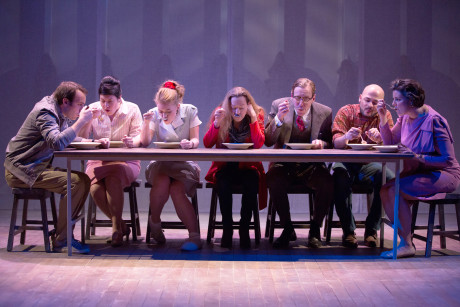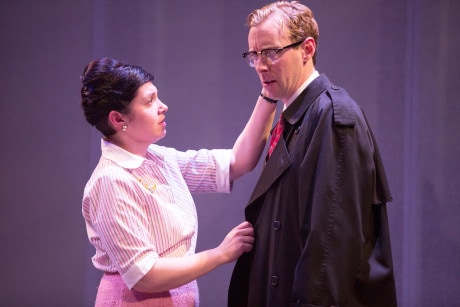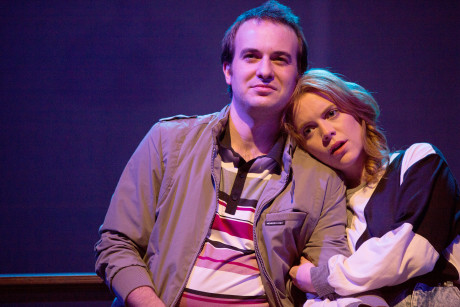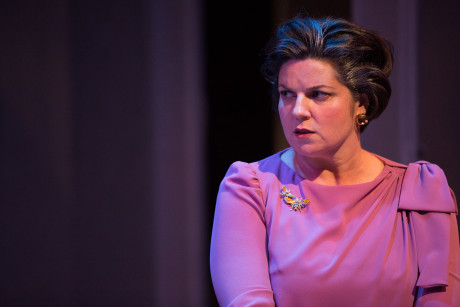This play by Andrew Bovell in this 1st Stage production burned so many astounding images onto my brain—and sent into my ears so many searing exchanges—that my head is still spinning.

For instance there’s a scene when we see the same character, Elizabeth Law, at two different ages in her life played by two different actors. (The play travels back and forth in time over 80-odd years, between rooms and landscapes in England and Australia, with eras and locales overlapping and segueing into one another—which sounds lots harder to follow than it actually is.) Thus we see Kari Ginsburg playing the younger Elizabeth; Teresa Castracane, the older, on the same spacious stage in the same placeless neutral gray set of see-through scrim (handsomely designed by Luciana Stecconi and eloquently lit by Brittany Diliberto), each wearing age-appropriate clothes (smartly designed by Kelsey Hunt) befitting a rather ordinary matronly Englishwoman.

We have already seen the younger Elizabeth’s howl of betrayal and outrage upon discovering that her husband, Henry, has been keeping a shameful secret and living a terrible double life. (It would be a spoiler to say more. When the Rain Stops Falling is nonstop suspenseful; its plot points are disclosed in a confluence of revelations that cascade one upon another—some so literally breathtaking I gasped involuntarily.)
We have seen Henry (a role Dylan Morrison Meyers makes indelible) demolished in self-reproach. We have already seen the younger Elizabeth expel him from her life, for he has become a stranger to her—he the adoring father of Gabriel, their seven-year-old son. (Elizabeth will never tell Gabriel the horrible reason his father left—an absence that will distress Gabriel all his life.) And now we see Elizabeth younger and Elizabeth older onstage at once. They neither see nor speak to each other, but as embodied in two powerful performances by Ginsburg and Castracane they send unspoken emotional depth charges to us in the audience—for we now behold what that dreadful sins-of-the-father plot point has done to Elizabeth long after her son is grown and gone from her life too.
The moment is beyond heartbreaking. In substance it surpasses Ibsen’s Ghosts. It approaches the fearsome pity of classic Greek family tragedy.
And there’s more upon more over the two-hours traffic of this sprawling and enthralling intergenerational epic—which Time magazine named best play of 2010—in a fascinating production directed rivetingly by Michael Dove.
A page in the program contains a paragraph synopsis, a color-coded genealogy chart titled “Two Families Across Four Generations,” and a note titled “Family Tree Explained.” Taken together they’re a listening assist I recommend, because it tips you off the way myths familiar to theatergoers in Ancient Greece functioned as a collective Spark Notes for the drama about to unfold onstage. Soon enough you will learn that the payoff for perusing this quick preshow crib sheet is profound.
The play begins in a downpour—the ensemble rushing about under umbrellas—then a zone of dazzling poetic diction that becomes its linguistic home, even as the stories’ times and places shift. An old man living on an Australian coast is about to receive a visit from the son he abandoned. And a fish falls out of the sky. Lest we expect lifelike to be naturalistic. And lest we suspect the improbable of being anything but true to life.
In ensuing scenes a tapestry of interwoven images unfurls—of fish soup, of rooms, of hats, of rain, of familial friction, of young love, of life new born and death impending. And it envelops you—washes over you, actually, like coastal surf, or like the rain that seems ever to fall (in Sarah O’Halloran’s subtle and lovely sound design).

We meet Gabriel Law (a touching Scott Ward Abernathy) who has come to Australia in search of the man who abandoned him when he was seven. There he meets Gabrielle York (a feisty Sara Dabney Tisdale), a roadside diner waitress who chooses him to be her first time. Their love is complicated not only in and of itself but by what has been passed down to them unawares and what they in turn unwittingly will pass down. Therein lies the deepest satisfaction of this play: to see revealed in multiple time frames and interconnecting lineages all the legacies in lifetimes that the characters before us cannot possibly know themselves but that a brilliant script in a beautiful production makes as transparent to us as scrim.
Also outstanding in related roles are Frank Britton as Joe Ryan, stepfather to Gabrielle’s son (whom she names Gabriel, after his father); Amy McWilliams as Gabrielle York late in life (when the failure of memory is all there is); and Mark Lee Adams as Gabrielle’s boy Gabriel grown up (with a slate not blank but already much etched).

When the Rain Stops Falling—which, ironically, reminds us how little we can really know much less remember about all that lives through us in our lives—is a wonderfully original work of topnotch theatrical artistry that is as readily accessible as it is utterly unforgettable.
Running Time: Two hours, without intermission.
When the Rain Stops Falling plays through February 28, 2016 at 1st Stage – 1524 Spring Hill Road, in Tysons, VA. For tickets, call (703) 854-1856, or purchase them online.
Note: When the Rain Stops Falling is indeed a long drink of water, but in performance its two hours fly by; its pacing is pulse-beat perfect. Still, one might wish to limit one’s literal liquid intake beforehand as there will likely be restroom lines after.
RATING:





